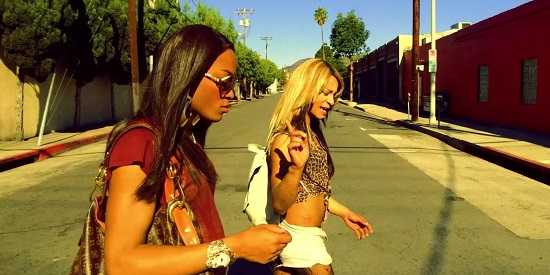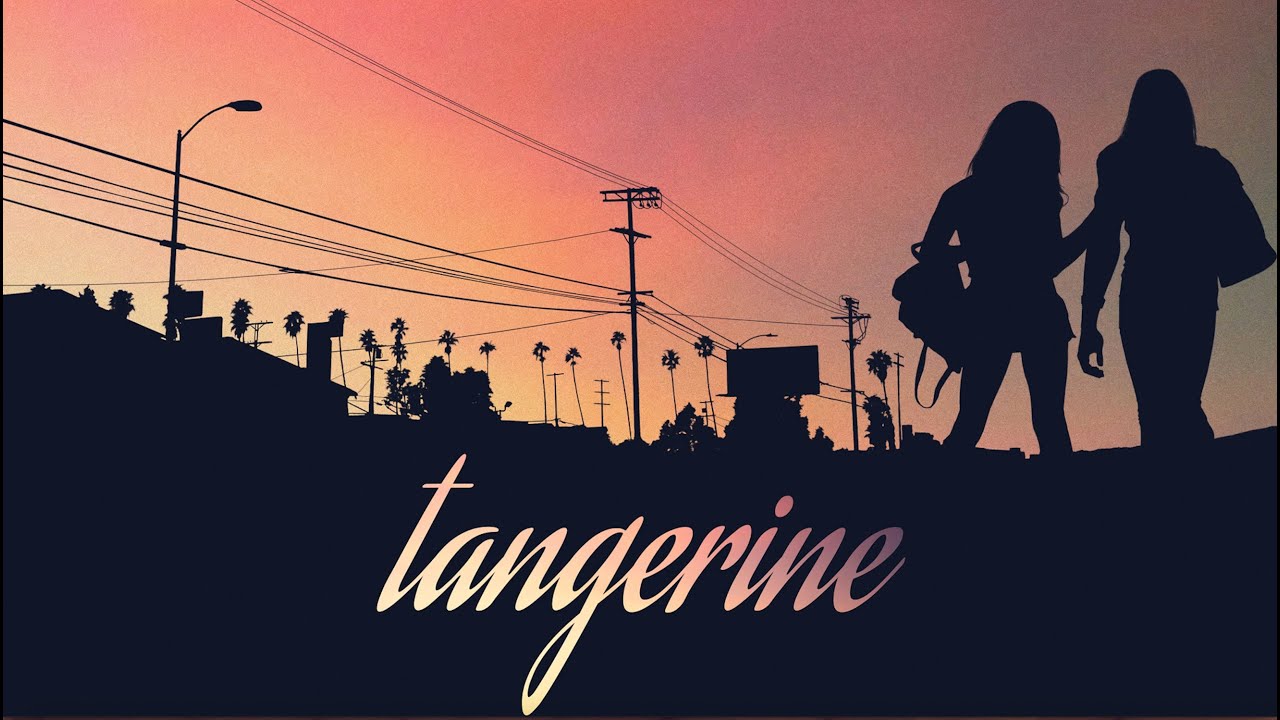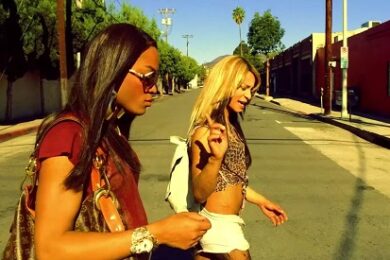Sean Baker has cultivated a reputation as a sympathetic chronicler of marginalised American lives. His interest lies in telling conventional stories about non-conventional characters, normally those burdened by financial despair and the surprising alliances formed under such challenging circumstances.
In his debut feature Take Out, Baker follows a Chinese immigrant as he struggles to raise enough tips to pay his debts to a loan shark, and in 2012’s morality tale Starlet, a cross-generational friendship is formed between a retired widow and an aspiring porn actress. With all these films Baker has demonstrated a remarkable ability to articulate the rhythms of everyday life with surprising authenticity, making small indie films about big societal issues. His characters may find themselves in heart wrenching situations, but they’re never portrayed as victims of anything other than the environments they find themselves in.
His latest film, Tangerine is a raucous comedy about two transgender prostitutes, Sin-Dee (Kitana Kiki Rodriguez) and Alexandra (Mya Taylor) who work on Los Angeles’ Santa Monica Boulevard. Set on Christmas Eve, Sin-Dee has just been released from prison only to discover that her boyfriend, Chester (James Ransone), has been sleeping around behind her back. Determined to find the culprit, Sin-Dee hits the streets, dragging the audience along with her on a voyage across Tinseltown’s red-light district.
Baker shoots his cast with tremendous sympathy, circumventing any accusations of anthropological fetishism. In this moment, when transgender celebrities like Caitlyn Jenner and Laverne Cox have found themselves on the cover of major American publications, Baker’s decision to avoid making a moralistic film is highly commendable. However, he’s still cautious of upsetting the warriors of social media by referring to himself as cisgender; the term for someone whose gender identity aligns with the one they were assigned at birth.
In what feels like a pivotal moment in the history of independent filmmaking, Tangerine has also received a lot of attention for being shot entirely on an iPhone. Baker’s DIY aesthetic extends as far as only using music sourced from artists he discovered on SoundCloud. This may conjure images of poor quality YouTube videos and tinny home-recorded songs, but it shouldn’t. Speaking to Baker, it’s very clear that he’s a director who loves cinema and the tactile qualities of celluloid and the film looks and sounds incredible.
Since her Vanity Fair cover, the media have appointed Caitlyn Jenner as the face for transgender identity. However, there’s been a lot of talk on social media that maybe she isn’t the right person to represent the community because she’s a white privileged celebrity. With Jenner’s story the dominant Transgender narrative how important do you feel Tangerine is in terms of representation?
Sean Baker: It’s not that she’s the wrong face, it’s that she’s just one face. When people are slamming her for that reason it doesn’t seem right.
Mya Taylor: The thing that isn’t right about it is Lavern Cox has been out for so long and people don’t talk about Lavern in the same way they talk about Caitlyn.
SB: But there is a difference, I mean Bruce was an Olympian, a humongous star.
MT: He was super gorgeous back then too, super gorgeous.
SB: But the fact that he was already a celebrity makes it different. We knew her old identity and then she transitioned, I think that makes a difference. I consider Laverne as just as important. The fact that she was the first trans person on the cover of Time Magazine was major.
MT: Laverne has really knocked down the door for us and, in a way I feel Laverne inspired Caitlyn to become Caitlyn, so Laverne should be the face.
Considering the film’s subject matter it would have been incredibly easy for you to tell a more conventional victim narrative without the film’s humour.
SB: It was Mya that really helped me find that style. She pushed me towards comedy. My other films have all been dramadies and there’s always humour throughout them but this one is an overt comedy and Mya was the one who requested that. At first I was really scared about the balancing act and how it would look coming from a cisgender white male from outside that world but at some point you just have to put the blinders on and make the movie you think is right, then deal with the aftermath.
The humor feels very organic, how much was scripted and how much was improvised?
SB: It was always there. We knew it would be really funny but we didn’t know the humor was going to be infused into the style as succesfully as it is. We knew humor was going to come from dialogue and behavior but we didn’t know it was actually going to be structured in a way where we’re actually setting up jokes and delivering punch lines and using the cutting and the music to enhance that comedy. When Mya and I had our initial discussion we agreed it should be entertaining for the women on the corner on Santa Monica Boulevard. It shouldn’t be a ‘plight of’ movie.
Was there anything either of you wanted to keep in but was vetoed by the other?
MT: Yes!
SB: Oh, what was that?
MT: There was this one scene that I really, really loved. It was a shot towards the end when Sin-Dee is telling Chester who it was that told her he was cheating. She says to him “It was my best friend over here Dark Vader”, pointing to me and I’m like “Just because I’m black bitch, come on”. I thought it was so funny. Do you still have that shot Sean?
SB: Yeah, I just don’t know if the delivery was that hot on it. It was a good joke it just didn’t work. We were rushed that night and we were already on our third night shooting on that corner. We were just begging Donut Time to let us continue filming whilst locals were trying to make their way into the scene. It was pretty stressful.
Los Angeles is often referred to as the world’s most photographed city. However, you manage to capture a side of it that feels unique. How important was it for you to develop that sense of place?
SB: It was extremely important for me because I’m not from LA. I’m from New York originally so it was important for me that Angelenos gave me the thumbs up. We tried to stay geographically accurate. We filmed on real bus routes and there’s only one ‘cheat’ in the film. Most of this was thrust upon us by circumstance but it was also one of the benefits of having to use the iPhone. Your stuck with this small lens, we had an anamorphic adapter over the lens, but the lens is stuck at a focal length that’s very wide, its almost fish eye, it’s about 23mm so you see everything. Some people have come up to us after screenings or at festivals and said they appreciated being able to see the environment and what LA looked like in 2014. You can see the cars, you can see the buildings, you can see the environment, and I think that was just one of those happy accidents that was forced upon us by having to use the iPhone but it was something that really works well in the movie.
A lot has been made of you using an iPhone to make the film, and in this digital age it does feel like a major landmark in filmmaking. People might expect the film to look visually inferior but it looks fantastic, and it’s clearly shot by someone who appreciates the tactile qualities of celluloid. How did you achieve that look?
SB: It was very important for me to recreate the look of shooting on film. Not only did we have tools that helped us get there whilst filming, helping us capture the image right, but in postproduction we were pumping up the colors and adding grain. When we were shooting we framed in the 2:3:5 ratio and we took that into consideration with every single shot. There was a deliberate action on our part to elevate this to a cinematic level and make it something that was worth seeing on the big screen. We understand that most people will be seeing it on their iPads, or ironically on their iPhones, but I still feel the better experience comes from seeing it in a big theatre. This is definitely one of those films that benefits from being seen with as an audience because comedy is a communal thing.
Were there any other directors who influenced you whilst making this film?
SB: Mike Leigh was a major influence on this film, not only with the way we approached the politics of the film but also the structure. When I first approached Mya and Kiki I said I have three very thin ideas. The first was that the film had to take place in one night, because of the budget. Second, was I thought two people were going to find each other but I wasn’t sure what genre it’s going to be. The third was I wanted my ensemble cast to converge at the end in some sort of confrontational scene that takes place at Donut Time. That all stems from Mike Leigh’s approach like Secrets And Lies and High Hopes where there’s that convergence and revealing of, well secret and lies. He was very influential on this film.
How has the film been received?
SB: In the US its been very well received by people across the board. We’ve played festivals across the world, in Korea, Greece, and Australia and its all been positive. Our first review from a Trans person came from Australia and it was very positive too. The negativity, if any, came from people before they saw it. There was a lot of speculation and a lot of doubt. I had an acquaintance that told me not to make the movie. He was one of those who wasn’t transgender himself, he was just involved with the trans community and was very worried about representation. It worried me at the time, I remember thinking maybe there isn’t a way I can make this movie.
MT: I know exactly who you’re talking about and he loves the movie now. We did a screening in LA and he was there. I was kind of nervous because I remembered what Sean had said about him. I was at the Q and A after and he came up to me once it was finished and told me he loved the movie. I said get out of my face you fake ass bitch!
SB: Terminology is such a major thing, especially now that it’s changing so rapidly. What’s politically correct one day won’t be politically correct the next, especially if you’re not from the world you’re talking about.
.
Is that something you take into consideration? How the terminology used in the film could be seen in 10 years time?
SB: Yeah, look at the word coloured. It’s massively looked down upon now but it never used to be. Now even African American is becoming controversial.
MT: I personally just hate it because it makes me think of Africa and I don’t feel any connection to Africa. You can tell when a black person is from America and when they’re from Africa. But it is what it is, I know who I am.
SB: Regarding the terminology we had an incident with our first press release in Sundance. It went out referring to the character of Dinha as a biological woman, when the proper term is Cisgender.
MT: In a way I understand it because in a sense I was biologically born a man.
SB: If you want to get down to the science of it it’s chromosomal but even that is considered un-PC because you’re being too specific, so you just use cisgender. But who knows if cisgender will be offensive in ten years time.
MT: I really want to say I was born a woman, I was just assigned male at birth. But sometimes you’re like c’mon, you know who you are, you were born with a dick, accept that, move on, stop being so fucking sensitive. I can’t tell the whole world that but it’s the truth.
Tangerine is in selected cinemas now




